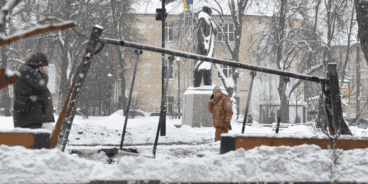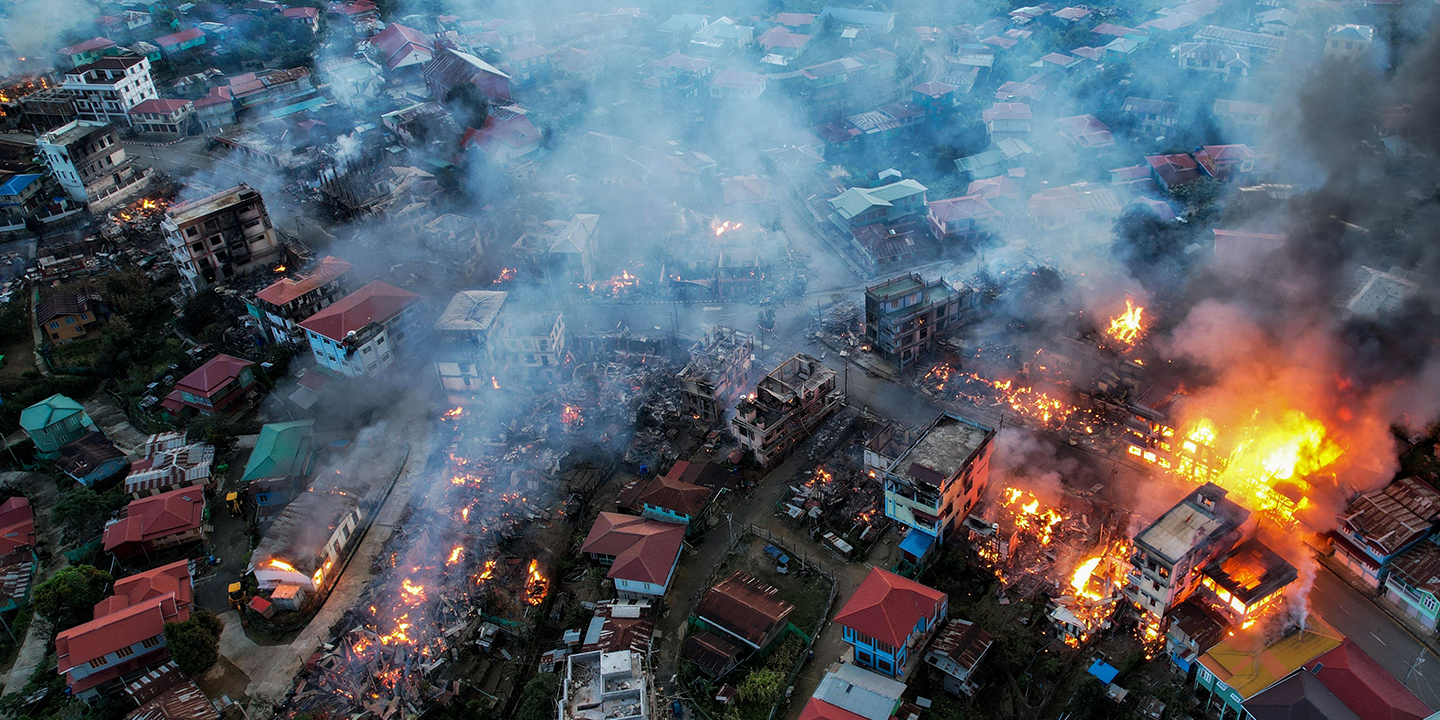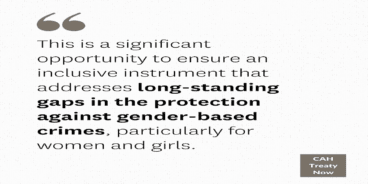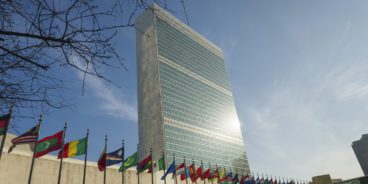

Atrocity Alert No. 337: Myanmar (Burma), Nicaragua and South Sudan
Atrocity Alert is a weekly publication by the Global Centre for the Responsibility to Protect highlighting situations where populations are at risk of, or are enduring, mass atrocity crimes.
MYANMAR’S MILITARY CONTINUES ABUSES IN “UNENDING HUMAN RIGHTS CRISIS”
Throughout the two years since Myanmar’s (Burma) military launched a coup in February 2021, they have perpetrated a scorched earth campaign around the country in an effort to quash the opposition, according to a new report from the Office of the UN High Commissioner for Human Rights (OHCHR). One of the most frequently utilized tactics by the military is the systematic and widespread burning of villages and dwellings. Nearly 39,000 houses around Myanmar have been burnt or destroyed in military operations since February 2022, marking a more than 1,000-fold increase compared to 2021. Sagaing Region – a resistance stronghold in the northwest – was the most impacted, accounting for more than 25,500 homes.
The military’s continued access to aviation fuel has, in part, facilitated the commission of these unlawful and indiscriminate airstrikes. Despite some targeted sanctions, aviation fuel deliveries continue to be offloaded to ports in Myanmar, according to a recent investigation by Amnesty International and Global Witness. Companies in Greece, India, Japan and Switzerland have been involved in fuel shipments. Since mid-2022, OHCHR documented an increase in aerial attacks by the military, as well as the widespread and indiscriminate use of artillery against villages and towns across the country. Although most of the intense violence remains concentrated in northwestern and southeastern Myanmar, OHCHR reported that nearly 80 percent of the country’s 330 townships have been affected by clashes.
Since the coup, populations also face daily human rights violations and abuses, including killings, arbitrary arrests, displacement, torture and enforced disappearances. UN High Commissioner for Human Rights, Volker Türk, stated, “There are reasonable grounds to believe that the military and its affiliated militias continue to be responsible for most violations, some of which may constitute crimes against humanity and war crimes,” and stressed that “Tragically, regional and global efforts for peace and restraint have largely fallen on deaf ears. The military, emboldened by continuous and absolute impunity, has consistently shown disregard for international obligations and principles. Urgent, concrete action is needed to end this festering catastrophe.”
The military’s continuous violence and commission of atrocity crimes have sparked an unending human rights and protection crisis. Savita Pawnday, Executive Director of the Global Centre for the Responsibility to Protect, said, “The international community must heed the recommendations of the UN’s Human Rights Office, including urging the UN Security Council to refer the situation in Myanmar to the International Criminal Court. Furthermore, all companies should immediately stop supplying aviation fuel to Myanmar and conduct appropriate human rights due diligence to ensure their supply chains no longer enable the military’s unlawful attacks.”
NICARAGUAN GOVERNMENT IMPLICATED IN POTENTIAL CRIMES AGAINST HUMANITY
In a groundbreaking report released on 2 March the UN Human Rights Council (HRC)-mandated Group of Human Rights Experts on Nicaragua (GHRE) concluded that widespread human rights violations that amount to crimes against humanity – including extrajudicial killings, torture, sexual violence, arbitrary detention and politically motivated persecution – have been perpetrated by the Nicaraguan government against civilians. The GHRE identified the National Police, the National Penitentiary System, judges, prosecutors and pro-government armed groups as the main perpetrators, acting under the authority, as well as participation, of President Daniel Ortega and his wife, Vice President Rosario Murillo.
The GHRE warned that systematic violations and abuses, including arbitrary deprivation of nationality, are part of a “deliberate dismantling of democratic institutions and destruction of civic and democratic space,” with the objective to “eliminate, by different means, any opposition in the country.” Since early February, the Ortega government has revoked the citizenship of more than 300 alleged political opponents, 222 of which were forcibly deported to the United States. Investigators warned that these latest measures are a clear indication that the situation continues to worsen.
Following a brutal crackdown on protests in 2018, the Office of the UN High Commissioner for Human Rights (OHCHR), as well as Independent Experts mandated by the Inter-American Commission on Human Rights, warned that crimes against humanity have been committed by state and affiliated non-state agents. Since then, systematic government repression and a descent into authoritarianism have intensified, with human rights defenders, independent media, students and academics, religious leaders and other alleged opponents targeted for persecution. President Ortega maintains absolute control over the country’s institutions, including the legislature and judiciary, which has failed to address impunity for human rights violations and abuses committed prior to the escalation in 2018 and in the subsequent years. Those unable to flee the country have faced systematic reprisals and criminal prosecutions. Official numbers provided by the GHRE and OHCHR suggest that more than 3,000 nongovernmental organizations were forcibly shut down since December 2018, and no independent media outlet can operate within Nicaragua.
As Nicaragua continues to refuse to engage with regional and international human rights mechanisms, the work of the GHRE remains vital for public monitoring and reporting, as well as for the collection and preservation of evidence of crimes against humanity. During the ongoing 52nd session of the HRC, member states should renew the mandate of the GHRE for a period of two years. Elisabeth Pramendorfer, Nicaragua expert at the Global Centre for the Responsibility to Protect, emphasized that, “States should utilize the evidence collected by the GHRE to pursue accountability for victims, including through universal jurisdiction, and further strengthen a robust individual sanctions regime against high-level perpetrators.”
NEW UN REPORTS HIGHLIGHT CONTINUED ATROCITY CRIMES IN SOUTH SUDAN
On 7 March the UN Human Rights Council (HRC)-mandated Commission on Human Rights in South Sudan (CHRSS) presented its latest report on the country’s human rights situation, detailing ongoing gross human rights violations and atrocities, including widespread attacks against civilians, various incidents of conflict-related sexual violence against women and girls, forced displacement and extrajudicial killings. The violations and abuses have been perpetrated by members of the South Sudanese armed forces, as well as various militias and armed groups.
The Commissioners identified the absence of accountability as a major driver of the human rights and humanitarian crisis, stating that “attacks against civilians persist precisely because perpetrators are confident they will enjoy impunity.” Although the extended transitional period provides an opportunity for the South Sudanese authorities to “begin dismantling an entrenched culture of impunity and to reset the country on a path toward stability and prosperity after years of conflict,” justice for victims and survivors of atrocities continues to be elusive. The Commissioners noted that “effective prosecutions are rare and remain woefully insufficient.”
The latest report of the UN Secretary-General on the Mission in South Sudan also details continued cycles of inter-communal violence, land disputes with ethnic undertones, abductions and reprisal attacks throughout the country. According to the report, the “rapid escalation of subnational violence” and recent cycles of revenge killings threaten the progress made in implementing the 2018 peace agreement. Political leaders have continued to focus on preserving their own personal power, allowing mistrust to reinvigorate ethnic tensions and fuel violence across the country rather than genuinely commit to a political solution. Continuous political competition and mobilization of armed groups is leading to increasing localized conflict, fragmentation and widening ethnic divisions.
Genuine political commitment to the implementation of the outstanding provisions of the peace agreement, including drafting a new constitution and establishing mechanisms under the Constitution-Making Process Act, is crucial for reconciliation and the prevention of further conflict. To break the cycle of impunity, the transitional justice mechanisms under Chapter V of the peace agreement need to be urgently established. Given its invaluable role in monitoring and reporting on atrocity crimes and grave human rights violations, the HRC must extend the mandate of the CHRSS in full, for a period of two years, during its ongoing 52nd session. Juliette Paauwe, South Sudan expert at the Global Centre for the Responsibility to Protect, said, “HRC-mandated investigative mechanisms are particularly important in situations where there are no realistic avenues for justice and accountability in the national context and can serve as an important deterrent. The added value of the CHRSS is self-evident and undeniable, and its work offers some glimpse of hope for justice and accountability to civilians in South Sudan.”
Related Content


